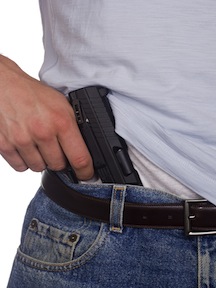By Julia Torres
On October 29, the Saint Joseph’s University chapter of Phi Beta Kappa sponsored the annual Constitution Day, in conjunction with the Provost’s Office, the Political Science Department, and SJU Reads. This year’s Constitution Day, “Handguns: Freedom and Violence,” was a reenactment of the Supreme Court Case District of Columbia v. Heller (2008) which ruled that the Second Amendment protected an individual’s right to posses firearms. Constitution Day was designed by Senator Robert Byrd of West Virginia in 2004. The holiday, celebrated on September 17, requires all federally-funded American schools and federal agencies to hold educational programs about the Constitution in order to remember and celebrate American ideals and history.
In commemorating this day, nine members of the university (six professors, two undergraduates, and one recent graduate) sat as the Supreme Court and, with another professor and a recent graduate, recreated the trial using the official transcript. The reenactment was preceded with an overview about the issues of gun rights and was closely followed by questions from the audience about the case.
The case, District of Columbia v. Heller, raised important questions about the scope of the Second Amendment: “A well regulated militia being necessary to the security of a free state, the right of the people to keep and bear arms shall not be infringed.” Heller, the respondent, argued that the District of Columbia’s ban on handgun possession as well as the requirement for residents to keep lawfully owned firearms unloaded and dissembled or bound by a trigger lock or similar device was a violation of the Second Amendment. The Supreme Court upheld this understanding, that the ban was a violation of an individual’s right to possess a gun. The key questions of the reenactment centered on these conflicts of individual rights and regulations. Susan P. Liebell, a political science professor and Constitution Day director, expanded the question, asking: “Is there some sort of freedom involved in owning a gun that the Constitution protects?”
The importance of freedom and the consequences of violence were reoccurring themes in this case. As Liebell explains: “Where as some people who think of freedom of speech or reproductive freedom or freedom to assemble as significant to their liberty, some people think that the ability to keep a firearm next to their bed or to be able to walk around with it in the street is also significant to their liberty.” In recognizing the complexities and costs of freedom and guns, Elizabeth A. Linehan, R.S.M, a philosophy professor who teaches several courses on violence, warns that “gun violence is a kind of health issue just like polio is, the causes are different but the fact of how many people are injured and killed is a kind of health issue that we can’t get rid of.” Both professors touched on the difficulties of both sides of the argument of guns in relation to freedom and guns in relation to violence.
Liebell and Linehan both viewed the university as a productive place to unravel these complexities. Linehan defined one of the main goals of the university to be to “educate students to be critical thinkers about and pay attention to what’s going on where they are, and where they are right here is in the city of Philadelphia, a place where there is a high prevalence of gun violence.” Liebell stressed a similar propensity for open-mindedness and critical thought. “Our passions about guns run very high so the people who are for them are so extremely for them and the people who are against them are extremely against them and university spaces are often ones in which one can have more informed dialogue that get out the passions so that you can get to the heart of what the real issues are,” she said.
In recognizing that some of the original members of Phi Beta Kappa were influential in the creation of the Second Amendment and the general political environment of the eighteenth century, Liebell added: “The eighteenth century was about enlightenment; Phi Beta Kappa is about enlightenment, it’s about shining light on issues and thinking hard even about difficult things, and creating spaces of safe to do that in.”
Julia Torres is a senior at Saint Joseph’s University majoring in English. She became a member of Phi Beta Kappa in 2013. Saint Joseph’s is home to the Phi of Pennsylvania Chapter of Phi Beta Kappa.




